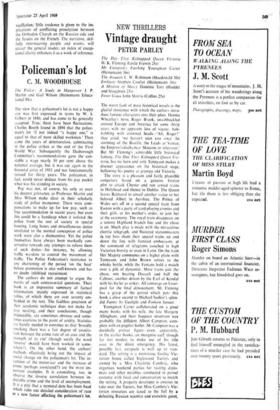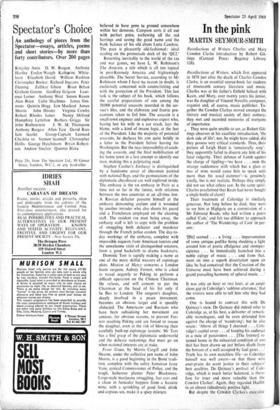The Day They Kidnapped Queen Victoria H. K. Fleming (Leslie
Frewin 28s)
NEW THRILLERS
Vintage draught
PETER PARLEY
The Day They Kidnapped Queen Victoria H. K. Fleming (Leslie Frewin 28s)
Mr Campion's Farthing Youngman Carter (Heinemann 30s)
The Assassin L. W. Robinson (Macdonald 30s) Embassy -Stephen Coulter (Heinemann 30s) A Mission of Mercy Dominic Torr (Hodder and Stouehton 25s)
Fever Grass John Morris (Collins 25s)
The worst fault of most historical novels is the gleeful insistence with which the authors intro- duce famous characters into their plots. Dennis Wheatley's hero. Roger Brook, swashbuckled around Europe and America for some thirty years with no apparent loss of vigour. hob- nobbing with crowned heads—`Ah, Roger!' they cried. 'we haven't seen you since the storming of the Bastille. the Leads at Venice, the Empress's dacha near Moscow. or wherever.' But Mr Fleming's admirable little historical fantasy, The Day They Kidnapped Queen Vic- toria, has no hero and only Tennyson makes a discreet appearance on the historical stage, bellowing his poetry at grumpy old Victoria.
The story is a pleasant and fairly plausible conjecture based on a genuine Fenian plot to attack Chester and run armed trains to Holyhead and thence to Dublin. The Queen leaves Balmoral to unveil another statue to her beloved Albert in Ayrshire. The Prince of Wales sets off in a second special train from Euston with a party of card-playing cronies and their girls, at his mother's order, to join her at the ceremony. The royal train disappears on a remote Highland branch line and the chase is on. Much play is made with the miraculous electric telegraph, and flustered stationmasters in top hats shunt their special trains up and down the line with frenzied enthusiasm, at the command of telegrams couched in high Victorian brevity or even in Latin. On the train Her Majesty communes on a higher plane with Tennyson, and John Brown retires to the whisky bottle, while the Fenians hold a match over a pile of dynamite. More trains join the chase, one bearing Disraeli and half the Cabinet, another driven by the Earl of Kendal with his bu:ler as stoker. All converge on Liver- pool for the final denouement. Mr Fleming has a grasp of the period which puts this . book a close second to Michael Sadleir's splen- did Fanny by Gaslight and Forlorn Sunset.
Youngman Carter collaborated on a great many books with his wife, the late Margery Allingham, and their happiest invention was probably the diffident Albert Campion, com- plete with ex-pugilist butler. Mr Campion was a decidedly prewar figure—even, apparently, in the earlier books, an incognito earl', though far too modest to make use of his title save in the direst emergency. His latest, possibly last, escapade is well up to stan- dard. The setting is a monstrous Gothic Vic- torian house called Inglewood Turrets and owned by a Miss Charlotte Cambric, who organises weekend parties for visiting diplo- mats and other notables, conducted in period costume with food and conversation to match the setting. A property developer is anxious to take over the Turrets, but Miss Cambric's Vic- torian resources are taxed to the full by a defecting Russian scientist and erstwhile guest,
believed to have gone to ground somewhere within her demesne. Campion sorts it all out with perfect poise, eschewing all the red herrings and saving the good name and the bank balance of his old chum Lotte Cambric.
The pace is pleasantly old-fashioned: ideal reading on the promenade deck of the `QE2.'
Returning inevitably to the world of the CIA and war games, we have L. W. Robinson's The Assassin, a tale which is all too topical in post-Kennedy America and frighteningly plausible. The Secret Service, according to Mr Robinson whom I have no reason to-doubt, is exclusively concerned with counterfeiting and with the protection of the President. This last task is the subject of his book, which follows
the careful preparations of one among the 50,000 potential assassins recorded in the ser- vice's files, and the elaborate and frantic pre-
cautions taken to foil him. The assassin is a small-town engineer and explosives expert who,
having lost his wife in a car crash, lays the blame, with a kind of insane logic, at the feet of the President. Like the majority of potential assassins, he declares his aim quite boldly in a letter to the President before leaving for Washington. But the near-impossibility of catch- ing the assassin, and the final mobilisation of his home town in a last attempt to identify our man, making this a palpitating read.
Stephen Coulter's Embassy is distinguished by a handsome cover of chessmen painted with national flags, and the permutations of the diplomatic chessboard are well explored inside. The embassy is the us embassy in Paris at a time not so far in the future, with relations between the two countries at an all-time low. A Russian defector presents himself at the embassy demanding asylum and is wounded by another intruder who also shoots his guard and a Frenchman employed on the cleaning staff. The resident CIA man being away, the embassy staff is left to cope with the problem of smuggling both, defector and murderer through the French police cordon. The day-to- day workings of the embassy, complete with impossible requests from American tourists and the unwelcome visits of distinguished senators, form a good backcloth to drama backstairs. Dominic Torr is rapidly making a name as one of the more skilful weavers of espionage plots. Mission of Mercy concerns a London brain surgeon, Aubrey Forrest, who is asked to travel urgently to Peking to perform a difficult operation on the Chinese Chairman.
He refuses, and will consent to put the Chairman at the head of his list only if he flies to London. The surgeon's daughter, deeply involved in a peace movement, becomes an obvious target and is speedily abducted. The Americans and Russians who have been subsidising her movement are anxious, for obvious reasons, to prevent For-
rest reaching Peking and are forced to rescue
the daughter, even at the risk of blowing their carefully built-up espionage systems. Mr Torr has a fine grasp of the diplomatic underworld and the delicate reckonings that must go on when national interests are at stake.
Fever Grass, by Morris Cargill and John Hearne, under the collective pen name of John Morris, is a good beginning in the Bond tradi- tion, complete with the sultry Jamaican Jassy Vane, cynical Commissioner of Police, and the
tough, lecherous planter Peter Blackmore. Large-scale marijuana smuggling, fast cars and a chase in funicular hoppers from a bauxite mine, with a sprinkling of good food, drink and copious sex, make it a spicy mixture.











































 Previous page
Previous page